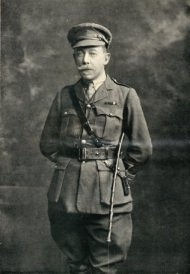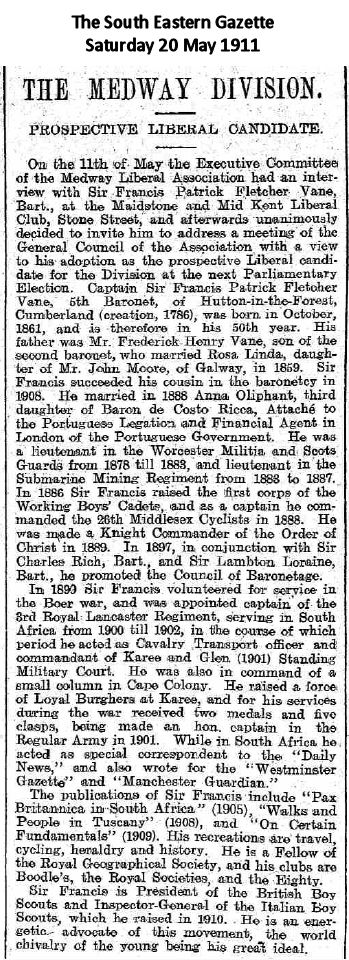|

Vane was born at 10 Great George’s Street,[2] Dublin 1861 to
an Irish mother and English father. He was raised in Sidmouth,
Devon, England and educated at Charterhouse School. In 1876,
Vane enrolled at the Oxford Military College.[1]
Military
career
After military college, Vane was assigned to the
Worcester Militia, Scots Guards[3] and for a stint with the
Submarine Mining section[4] of the Royal Engineers over the
period of 1883-1888. In 1886 he began residing at Toynbee Hall
in East London. That same year he started a 'Working Boys Cadet
Corps'. He became a captain in the 26th Middlesex Rifle
Volunteers in 1888. While serving in the Second Boer
War (1899–1902), he was appointed a magistrate in 1902. He was
removed from that position for supposedly being too
"pro-Boer".[1] He wrote "The War and One Year After" pamphlet in
1903 criticising the British method of war. With his follow up
pamphlet, Vane was "retired" from the military.[2]
Ireland
At the start of World War I, Vane returned to the Army as a
recruiting officer with the rank of Major and was sent to
Ireland, attached to the Royal Munster Fusiliers.
Between
military stints he worked at the Daily News, Manchester
Guardian, Westminster and Truth employed Vane from 1902 to 1904
as a reporter for South Africa. He was a Liberal general
election candidate for Burton. Following that he became active
in antiwar and suffragette campaigns from 1907-1912.[1][2] He
published two more items: Walks and Peoples in Tuscany (1908)
and On Certain Fundamentals (1909).
By 1909, Vane was the
Boy Scouting Association's (BSA) London Commissioner.
He
succeeded his cousin Sir Henry Ralph Fletcher-Vane as baronet in
1908. His first wife, Anna Oliphant da Costa Ricci, daughter of
the Baron Anselmo da Costa Ricci of Portugal, whom he married in
1888, died in 1922. Vane became a Knight Commander of the Order
of Christ (Portugal) in 1889. He married his second wife,
Kathleen Crosbie in 1927. Sir Francis died in 1934 aged 72,
after spending his last year of life in ill health at St Thomas'
Hospital in Lambeth.[14]
Acknowledgements to
- Wikipedia
- Working Class Movement Library
(photo) |
 |
|